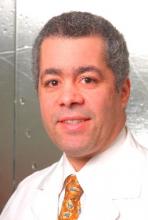ORLANDO – Both 12- and 24-week regimens of an investigational interferon-free therapy for hepatitis C were associated with high sustained virological response rates at 12 weeks post treatment in a phase II study of patients with hepatitis C virus genotype 1 who had baseline characteristics associated with poor response to interferon-based therapies.
The findings of this subgroup analysis of the randomized, open-label, multicenter Aviator trial demonstrate that the high response rates recently reported for the entire cohort also apply to patients with older age, black race, Hispanic/Latino ethnicity, interleukin (IL)-28B non-cc genotype, and higher body mass index (BMI), Dr. Frederick Nunes reported at the annual Digestive Disease Week.
The Aviator trial assessed the safety and efficacy of various dosing regimens and combinations of three AbbVie investigational direct-acting antivirals (DAAs) with or without ribavirin, including the potent hepatitis C virus (HCV) protease inhibitor ABT-450 dosed with 100 mg of ritonavir (ABT-450/r, dosed at 100 or 150 mg daily), the NS5A inhibitor ABT-267 (25 mg daily), and the non-nucleoside NS5B inhibitor ABT-333 (400 mg twice daily). A total of 247 patients were included in the subanalysis, Dr. Nunes reported at the meeting.
The regimen that included all three investigational drugs and ribavirin, known as 3 DAA/RBV, was associated with sustained virological response rates of 99% and 93% at 12 weeks in treatment-naive patients and previous peg-interferon/ribavirin (peg-IFN/RBV) null responders, respectively, said Dr. Nunes, who is clinical associate professor of medicine in the University of Pennsylvania Health System, and section chief of gastroenterology at Pennsylvania Hospital, Philadelphia.
In the current analysis, high sustained virological response rates at 12 weeks (SVR12) were also achieved in the 247 patients with chronic HCV genotype 1, including 159 treatment-naive and 88 previous peg-IFN/RBV null responders, who were assigned to 12 or 24 weeks of 3 DAA/RBV. The virological response rates were 99% and 93% for the treatment-naive 12- and 24-week groups, respectively, and 93% and 98% for the null responder 12- and 24-week groups.
The high responses occurred regardless of treatment duration, age, race, ethnicity, BMI, Homeostatic Model of Assessment–Insulin Resistance (HOMA-IR), IL-28B host genotype, or baseline viral load. The rates did not differ significantly on any comparison made in treatment-naive patients or previous null responders, he said.
In the treatment-naive patients, no breakthroughs occurred, although 1% of those in the 12-week treatment arm relapsed, and 3% of the 24-week treatment group relapsed.
In the null responder group, no relapses occurred, but breakthroughs occurred in 7% of those in the 12-week treatment arm, and in 2% of the 24-week treatment arm, he said.
Treatment was safe and generally well tolerated. Four patients discontinued treatment due to drug-related adverse events, most commonly fatigue (in 32.7% and 23.9% of treatment-naive and null responders, respectively) and headache (31.4% and 30.7%, respectively).
One patient had a serious adverse event (arthralgia) considered to be possibly related to the study drug regimen.
Because ribavirin was included in the treatment regimens, it is impossible to tease out whether the adverse events were associated with that drug or with the investigational DAAs, Dr. Nunes noted.
Patients included in the study were noncirrhotic adults aged 18-70 years with a BMI between 18 and 38 kg/m2, and HCV genotype 1.
"The overall efficacy was excellent irrespective of the baseline grouping. So black race, Hispanic/Latino ethnicity, age greater than 50, BMI over 30, male gender, HOMA-IR greater than 3, IL-28B non-cc genotype, and viral load greater than 7 logs all had very high SVR12 response rates," Dr. Nunes said.
The safety and efficacy of this interferon-free 3 DAA/RBV therapy will be further explored in phase III studies, he said.
Dr. Nunes has received grant or research support from Merck, Abbott Laboratories, and Roche Pharma AG.


